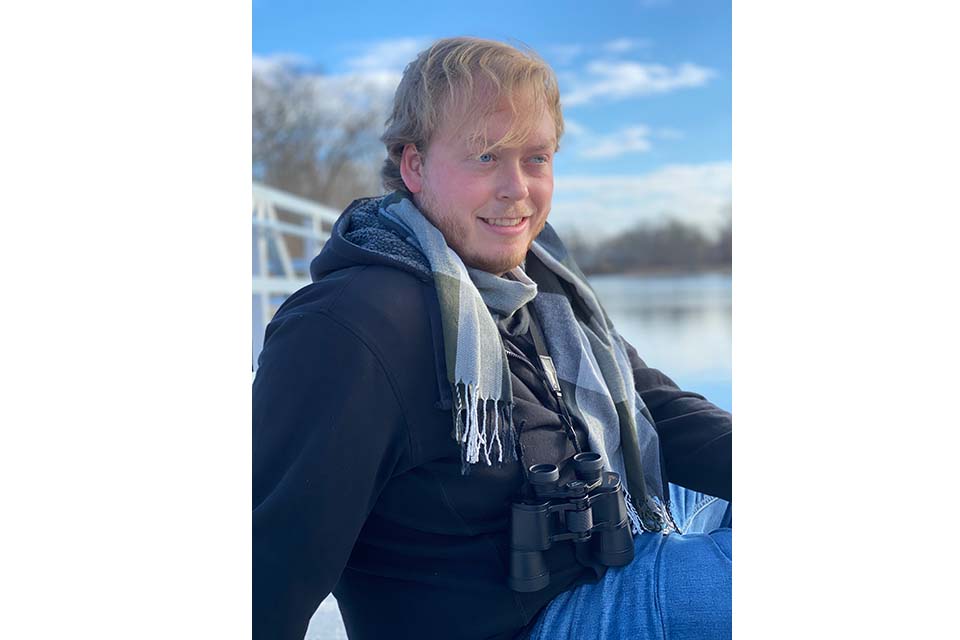Will Dahl, PhD'25, Celebrates Brandeis's Support and Interdisciplinarity

July 24, 2025
Abigail Arnold | Graduate School of Arts and Sciences
Throughout his time at Brandeis, Will Dahl, PhD '25 in Molecular and Cell Biology (MCB), found a strong community that supported him as he persevered with his work. “At the beginning,” he said, “starting grad school is a big transition,” made more so by the fact that he started his program in 2019 and had the COVID pandemic hit halfway through his first year. However, the experience brought him closer to the rest of his cohort, including his now-fiancée. “We came back and flourished in the end,” he said, “and Brandeis gave us continual support.” Dahl also said that his experience in Michael Marr’s lab was both enjoyable and good preparation for everything that lay ahead. “Mike is really getting things down to the details,” he said. “A lot of labs buy pre-made supplies so you don’t have to learn all the background, but Mike made sure that we knew better. So my time in his lab really prepared me for my current work in an academic lab, and I had a great time learning there.”
Dahl also participated in the Three Minute Thesis (3MT) competition, which he won in 2024. The competition challenges students to present their research in just three minutes to a general audience. While the MCB PhD program prepares students for public speaking, they typically present to others in the same field, so Dahl credits 3MT with helping him learn to speak to a broad audience without using jargon. He first participated in the competition in 2023 but did not make it past the preliminary round. “I completely choked and was silent for thirty or forty-five seconds because I forgot one line,” he laughed. “Basically all of my feedback was ‘You need to calm down.’ So I took that advice and prepared more for the next year, and it was very rewarding to come back and be recognized as the winner.” He practiced with the help of the graduate school’s professional development team and alongside his friend Pranav Ojha, who came in second in their category. “I’d say it’s the hardest speaking task I’ve ever had,” Dahl said, “but the most rewarding too.”
Now, following his graduation, Dahl has just started his term as a postdoctoral fellow at Cold Spring Harbor Laboratory – coincidentally, the place where he first heard of Brandeis when interning there as an undergraduate. While he is continuing to work as a biologist, he has switched from his PhD research focus on mammalian cells to yeast cell epigenetics. “The lab I’m in studies many different organisms, but I happened upon yeast,” he said; he was partially inspired by Kaushik Ragunathan’s lab at Brandeis, which brought S. pombe, the species of yeast that he now works on, to the university.
Dahl credits Brandeis’s interdisciplinary science community with helping him prepare for his role. “Brandeis has a uniquely community oriented feeling,” he said. “Everyone is exchanging ideas freely, even if we have non-overlapping expertises. Being exposed to both epigenetics and S. pombe during my PhD might not happen just anywhere!” Dahl particularly praised the interdisciplinary Quantitative Biology concentration as a site of connections. “I met physicists, chemists, biochemists, and computer scientists there (to name a few). Brandeis actively facilitated this with regular classes, talks, and research retreats attended by grad students from mixed programs.” Furthermore, his experience in 3MT helped him with speaking to people outside his own field of expertise during his interview process. In his interview for his current role, he had to give a talk to a team who focused on plant biology and completely different cellular processes than he did. “3MT really helped me distill why my project mattered, and that was very helpful for adjusting my talks to any audience!” he said.
After his postdoc, Dahl hopes to work in academia as a faculty member. In the meantime, he shared his advice for other PhD students in the field. “The biggest hurdle is definitely perseverance. You can do it – there is no doubt – but you can work as hard as you want and still have your experiments fail. Don’t blame yourself when things go wrong; just keep moving forward, and everything will all work out within six months before you graduate. The curiosity that drove you to do the PhD in the first place is something you should actively maintain – never lose the spark that keeps you interested in science.”






